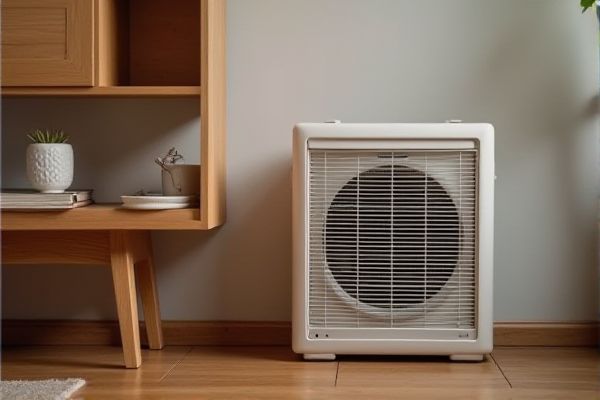
Choosing between a portable heater and a fixed heater depends on your heating needs, space size, and energy efficiency preferences; portable heaters offer flexibility and ease of movement, while fixed heaters provide consistent, long-term warmth and often better energy efficiency. Discover the pros and cons of each option to determine which heating solution best suits your home or office in the full article.
Table of Comparison
| Feature | Portable Heater | Fixed Heater |
|---|---|---|
| Installation | No installation required, plug and play | Professional installation needed, fixed to wall or floor |
| Mobility | Highly mobile; can be moved room to room | Stationary; limited to one location |
| Heating Coverage | Best for small, localized spaces | Designed for larger, consistent area heating |
| Power Source | Mostly electric; some fuel-based | Electric, gas, or hydronic systems |
| Energy Efficiency | Generally less efficient; short-term use | Higher efficiency; built for long-term heating |
| Cost | Lower upfront cost | Higher upfront and installation cost |
| Maintenance | Minimal maintenance required | Regular maintenance needed for optimal performance |
| Safety | Risk of tipping; often includes safety features | Fixed installation reduces tipping risk |
| Noise Level | May generate noise during operation | Usually quieter or silent operation |
Introduction to Portable and Fixed Heaters
Portable heaters offer flexible, space-specific heating solutions ideal for temporary or localized warmth, featuring easy mobility and setup. Fixed heaters are installed permanently, providing consistent, whole-room or building heating with higher energy efficiency and integrated system options. Choosing between the two depends on factors like room size, heating needs, energy costs, and installation preferences.
Key Differences Between Portable and Fixed Heaters
Portable heaters offer mobility and ease of installation, allowing you to heat specific areas quickly without permanent setup. Fixed heaters provide consistent, energy-efficient warmth by being integrated into your home's heating system, ideal for long-term use and large spaces. Your choice depends on whether you need flexible, spot heating or centralized, reliable temperature control.
Energy Efficiency Comparison
Portable heaters typically offer targeted heating for small spaces, which can reduce overall energy consumption by avoiding the need to heat entire rooms. Fixed heaters generally provide more consistent and efficient heating for larger areas due to integrated thermostats and better insulation management. Energy efficiency varies significantly based on thermostat control, insulation quality, and usage patterns in both portable and fixed heating systems.
Installation and Setup Requirements
Portable heaters require minimal installation, often just plugging into a standard electrical outlet, making them ideal for quick and flexible heating solutions. Fixed heaters demand professional installation involving mounting, electrical wiring, and sometimes connection to existing HVAC systems, which can increase upfront costs and time. Your choice depends on how quickly you need heat and your willingness to invest in a more permanent system.
Cost Analysis: Initial and Long-Term Expenses
Portable heaters typically have lower initial costs, making them budget-friendly for immediate heating needs, while fixed heaters often require higher upfront investment due to installation fees and equipment expenses. Over time, fixed heaters tend to be more energy-efficient and cost-effective, reducing your long-term utility bills compared to portable models that may consume more energy for the same output. Maintenance and durability also impact total expenses, with fixed heaters generally offering longer lifespans and lower servicing costs than portable alternatives.
Safety Features and Considerations
Portable heaters often include automatic shut-off mechanisms and tip-over protection to prevent fire hazards, making them safer for temporary use. Fixed heaters typically have integrated safety features like overheat protection and are installed with proper ventilation to minimize risks in permanent setups. Assess Your space and safety needs carefully to choose the heater with the most reliable protection features for your environment.
Heating Capacity and Coverage Area
Portable heaters typically offer heating capacity ranging from 500 to 1500 watts, suitable for small to medium-sized rooms up to 300 square feet. Fixed heaters, such as wall-mounted or central heating systems, provide higher heating capacity, efficiently warming larger areas or entire homes, with coverage exceeding 1,000 square feet. Your choice depends on the required coverage area and desired flexibility in heating different spaces.
Flexibility and Mobility Options
Portable heaters offer exceptional flexibility and mobility, allowing users to easily move heat to different rooms or specific areas as needed. Fixed heaters, such as wall-mounted or central baseboard units, provide consistent, permanent heating solutions but lack the ability to be relocated. The choice between portable and fixed heaters often depends on the need for adaptable heating versus stable, infrastructure-based warmth.
Maintenance and Longevity
Portable heaters generally require more frequent maintenance due to their mobility, which can lead to wear and dust accumulation affecting performance. Fixed heaters often benefit from more durable installation and consistent ventilation, contributing to longer lifespan and fewer upkeep needs. To ensure your heater operates efficiently and lasts, regular cleaning and timely inspection are essential regardless of type.
Choosing the Right Heater for Your Needs
Portable heaters offer flexibility and quick heating for small or temporary spaces, making them ideal for spot heating or rooms without central heating. Fixed heaters provide consistent warmth for larger areas with enhanced energy efficiency and automated temperature control through thermostats. Selecting between the two depends on room size, heating duration, energy costs, and mobility requirements.
 homyna.com
homyna.com